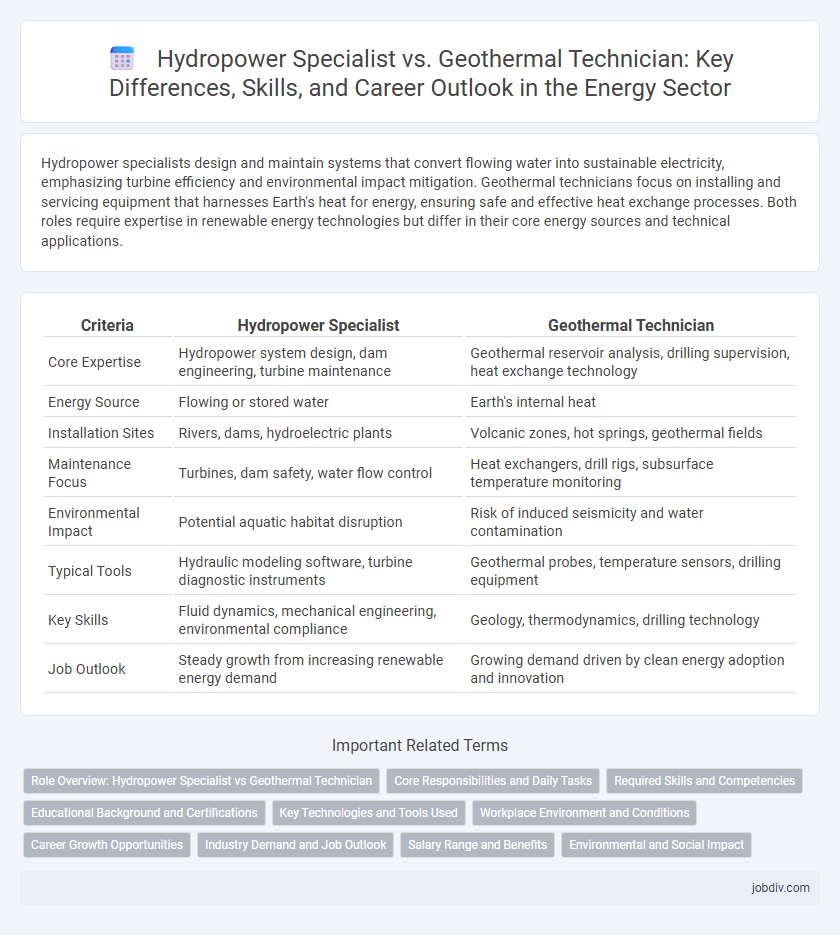Hydropower specialists design and maintain systems that convert flowing water into sustainable electricity, emphasizing turbine efficiency and environmental impact mitigation. Geothermal technicians focus on installing and servicing equipment that harnesses Earth's heat for energy, ensuring safe and effective heat exchange processes. Both roles require expertise in renewable energy technologies but differ in their core energy sources and technical applications.
Table of Comparison
| Criteria | Hydropower Specialist | Geothermal Technician |
|---|---|---|
| Core Expertise | Hydropower system design, dam engineering, turbine maintenance | Geothermal reservoir analysis, drilling supervision, heat exchange technology |
| Energy Source | Flowing or stored water | Earth's internal heat |
| Installation Sites | Rivers, dams, hydroelectric plants | Volcanic zones, hot springs, geothermal fields |
| Maintenance Focus | Turbines, dam safety, water flow control | Heat exchangers, drill rigs, subsurface temperature monitoring |
| Environmental Impact | Potential aquatic habitat disruption | Risk of induced seismicity and water contamination |
| Typical Tools | Hydraulic modeling software, turbine diagnostic instruments | Geothermal probes, temperature sensors, drilling equipment |
| Key Skills | Fluid dynamics, mechanical engineering, environmental compliance | Geology, thermodynamics, drilling technology |
| Job Outlook | Steady growth from increasing renewable energy demand | Growing demand driven by clean energy adoption and innovation |
Role Overview: Hydropower Specialist vs Geothermal Technician
Hydropower specialists design, install, and maintain systems that convert water flow into electrical energy, ensuring efficient turbine operation and compliance with environmental regulations. Geothermal technicians handle the installation, troubleshooting, and maintenance of geothermal heat pump systems that utilize earth's thermal energy for heating and cooling applications. Both roles require specialized knowledge in renewable energy technologies but focus on distinct natural resources and technical processes.
Core Responsibilities and Daily Tasks
Hydropower specialists design, operate, and maintain dams, turbines, and electrical generators to efficiently convert water flow into electricity, focusing on mechanical and structural systems. Geothermal technicians handle the installation, maintenance, and repair of geothermal heating and cooling systems, concentrating on subsurface energy extraction and heat exchange technology. Both roles require expertise in system diagnostics and compliance with environmental regulations, but hydropower specialists emphasize large-scale infrastructure, while geothermal technicians prioritize residential and commercial thermal applications.
Required Skills and Competencies
Hydropower specialists require expertise in fluid dynamics, mechanical systems, and environmental impact assessments to design and maintain efficient water turbine systems. Geothermal technicians must possess strong knowledge of thermodynamics, drilling technologies, and subsurface energy extraction methods to manage geothermal plant operations effectively. Both roles demand proficiency in safety protocols, data analysis, and renewable energy technology integration to optimize sustainable power generation.
Educational Background and Certifications
Hydropower specialists typically hold degrees in civil or mechanical engineering, emphasizing fluid dynamics, turbine design, and renewable energy systems, with certifications such as Certified Energy Manager (CEM) enhancing their expertise. Geothermal technicians often possess backgrounds in geology, environmental science, or mechanical engineering, coupled with certifications like Geothermal Heat Pump Installer or field-specific OSHA safety training. Both roles demand specialized knowledge in energy technologies, but their educational focus and credentialing reflect the distinct technical aspects of hydropower and geothermal energy production.
Key Technologies and Tools Used
Hydropower specialists primarily utilize turbines, generators, and control systems to harness the kinetic energy of flowing water, leveraging technologies like Kaplan and Francis turbines for efficient energy conversion. Geothermal technicians focus on drilling equipment, heat exchangers, and binary cycle power plants to extract and convert Earth's internal heat into electricity. Both roles require expertise in monitoring systems and diagnostic tools to optimize performance and ensure sustainable energy production.
Workplace Environment and Conditions
Hydropower specialists typically work in outdoor environments near dams, rivers, and power stations, often exposed to variable weather conditions and requiring physical activity such as climbing and equipment maintenance. Geothermal technicians operate mainly at geothermal plants and drilling sites, facing high-temperature and potentially hazardous conditions that demand strict safety protocols and specialized protective gear. Both roles require adaptation to remote and sometimes isolated locations, but hydropower specialists encounter more fluctuating natural environments whereas geothermal technicians manage more controlled but extreme thermal surroundings.
Career Growth Opportunities
Hydropower specialists benefit from a well-established field with consistent demand, offering career growth through roles in project management, environmental consulting, and infrastructure development. Geothermal technicians face expanding opportunities due to increasing investments in renewable energy, with career advancement possible via specialization in drilling technologies, system maintenance, and site assessment. Both careers emphasize sustainability, but geothermal energy's emerging market provides potentially higher growth rates in the coming decade.
Industry Demand and Job Outlook
Hydropower specialists are experiencing steady industry demand driven by the global push for renewable energy and infrastructure modernization, with job outlooks reflecting moderate growth as nations invest in sustainable water resources. Geothermal technicians face rising opportunities particularly in regions rich in geothermal activity and government incentives that promote clean energy, resulting in a faster employment growth rate compared to other renewable sectors. Both careers benefit from advancements in technology and increasing emphasis on carbon reduction, but geothermal technician roles show higher expansion potential due to emerging geothermal projects worldwide.
Salary Range and Benefits
Hydropower specialists typically command higher salaries, averaging between $70,000 and $100,000 annually, reflecting the sector's reliance on extensive engineering expertise and regulatory compliance. Geothermal technicians earn a median wage of approximately $50,000 to $75,000 per year, with benefits often including health insurance, retirement plans, and opportunities for overtime pay due to fieldwork demands. Both roles offer job stability in renewable energy, but hydropower specialists may receive additional incentives linked to project scale and environmental impact assessments.
Environmental and Social Impact
Hydropower specialists evaluate the large-scale environmental impacts of dam construction, including ecosystem disruption, fish migration interference, and community displacement. Geothermal technicians focus on managing localized land subsidence, induced seismicity, and the release of harmful gases such as hydrogen sulfide during plant operation. Both roles require balancing renewable energy benefits with mitigating adverse effects on biodiversity and surrounding communities.
Hydropower Specialist vs Geothermal Technician Infographic

 jobdiv.com
jobdiv.com